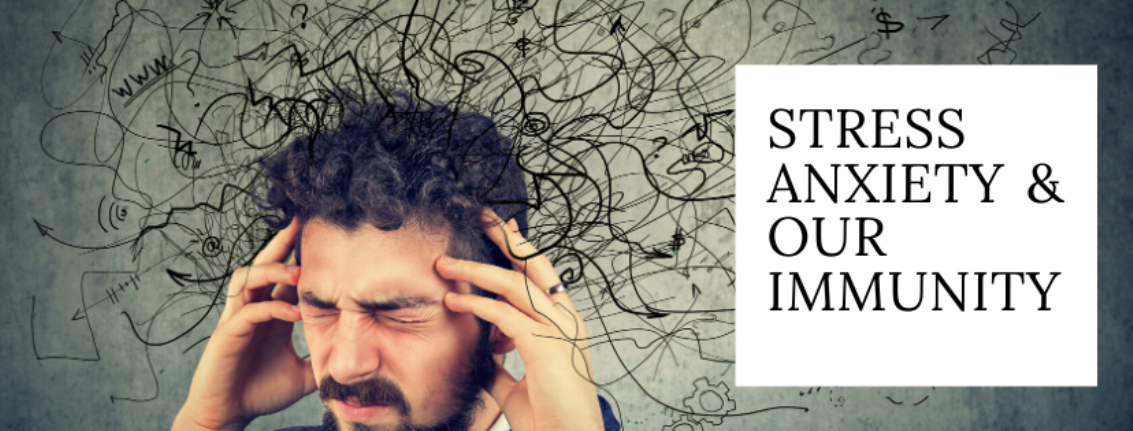Stress, Anxiety and Our Immunity

Easing COVID-19 Restrictions But Caution Required
May 3, 2020
Is post COVID-19 Chronic fatigue a real threat?
May 24, 2020Is stress or anxiety ruling your life?
Do you feel on edge all the time?
Just can’t seem to settle down to relax and fall asleep?
Let’s define stress and how it affects our immune health? What can we do about it?
Learn how to calm anxiety and stress and regain control.
How do we define stress?
Most consider stress to be a situation that is uncomfortable, distressful, out of balance, out of control. Feelings of strain, anxiety, irritability, nervousness, insecurity and overwhelmed are terms often used to describe how someone feels in a stressful situation.
Being caged up at home for so many weeks during the COVID-19 crisis creates a level of stress in itself, let alone dealing with the prospect of possibly losing work and the uncertainty of what the future holds.
Moderate amounts of stress help us grow, get stronger and fitter. Physiological stress applied to our cardiovascular system, exercising to the edge, stimulates release of growth factors, increased blood flow and delivery of oxygen and nutrients to the tissues.
We need the stress hormone cortisol to get out of bed in the morning to face the day.
The problems start when we cannot switch off stress
We have two types of stress response, the rapid fright/flight response triggering an adrenaline rush in an emergency or high stress situation, and the ongoing stressors that stimulate cortisol from the adrenals to provide the energy to keep going.
In this day and age, the few minutes of screaming terror are becoming all too frequent with road rage, social aggression or family violence becoming more the norm. Tension in the community is on the increase.
For those of us who have been living with stress, whether it be emotional or physical stress, the confines forced upon us by the COVID-19 virus can tip you over the edge.
What happens when stress gets out of control?
The consequences of high stress on your health are many.
They include fatigue, poor concentration, insomnia, headaches, dizziness, hormonal disturbances and sexual dysfunction, sugar cravings, increased abdominal fat, gut disturbance, constipation or diarrhoea, a weakened immune system, muscle weakness, aches and pains, and a heightened sensitivity to pain. Wow, that’s quite a list!
Most don’t realise, small amounts of stress are desirable and beneficial to health. Positive stressors improve motivation and physical performance and allow us to react to our environment. If we are coping well, our normal response to stress is to get tired; we compensate, recover, and get fitter, faster, and stronger.
Why do we need stress?
Without daily physiological stress such as needing to get out of bed to go to work, walk to the shops, go for a run, systems would shut down. Inactivity is far more detrimental to your health. It results in a metabolic go slow, sluggish blood flow and brain function triggering depression
The stress hormone cortisol is involved in normal sugar regulation, conversion of fats and protein for energy. Too much causes deposition of fat around the tummy. But we need it for proper functioning of the immune system, cardiovascular and gastrointestinal systems. We can’t function without it.
In a normal state of adaptation to stress, you should have the ability to deal with stress and recover. When stress levels become chronic and out of control, pushing too hard without putting on the brakes, a state of burn out or exhaustion can result.
Check out my book “How to Live a Life Without Pain” to learn more about how stress effects your immune health and chronic pain.
The Gut-Brain Connection
A stressful state directly effects your digestion, appetite, ability to eat, digest and provide essential nutrients for immune health.
In a stressed, fight and fright state we are on edge. This is an aroused sympathetic nervous state. The Vagus nerve, the 10th cranial nerve travels from our brain to the heart, lungs and digestive tract. This is a direct connection from brain to gut. When we are stressed, messages travel down the Vagus nerve to tell our heart to beat faster, our breath speeds up and becomes shallow, we get butterflies in our tummy and we lose our appetite.
In other words, digestion and absorption of our food to provide nutrition for our body is compromised.
This is not a one way street. You could say that this is really a brain to gut connection, but as we all know, the reverse also applies.
Bodily stress can originate from disturbance in the gut
These stressors may be bacterial overgrowth or candida, while at the same time, emotional stress can suppress our immune system that resides only one cell deep in the gut lining
This is what we call the Gut–Brain connection where issues with gut health can directly affect the way we think, our motivation, and our ability to concentrate.
Too much of the stress hormone cortisol impacts on our first-line immune defence by interfering with the body’s mucous linings in the gut and lungs. It follows that high levels of stress are a problem for our health. Stress suppresses specialised protective immune cells called Secretory IgA that sit in the mucous layer just above the gut lining. These are there to form a barrier to infection and protect the integrity of the gut lining.
Stress eats away the protective mucous layer in our gut
Stress therefore causes breakdown of the tight junctions that hold the gut lining cells together. The result is a ‘leaky gut’ with invasion of large food particles and pathogens into the body. We end up with activation of an exaggerated immune response that sends inflammatory cells throughout the body to embed in muscle, joints, brain and lungs.
In turn we get sore muscles and joints, brain fog and lung infection.
With a weakened immune response, individuals are more likely to develop chronic fatigue after a viral insult due to a lack of the ability to mount an adequate fight against that virus. This can ultimately result in hormone, immune and metabolic systems breakdown.
In summary, when things get out of whack, your immune system can either be suppressed and unable to mount a good fight in the face of COVID-19 or a winter flu or can go out of control and create a cytokine storm or autoimmune disorder attacking your good cells.
Your breathing can drive anxiety
As physiotherapists we are trained to assess your breathing pattern. When anxious or under stress the tendency is to short sharp breaths from the upper chest. Your neck and shoulder muscles work overtime and become painful and tense.
By learning how to switch from short upper chest breathing to a more relaxed diaphragmatic breathing you can restore calm.
An upper chest breathing pattern directly increases body acidity and drives the stressed sympathetic nervous state.
Regaining breathing control with a longer breath out than in shuts down the stress hormone cortisol to ease your anxiety. This technique is also very useful to calm breathing during an asthma attack.
Check out my video tutorial to find on how to switch to relaxed deep breathing and calm stress and anxiety.
Remember I am here to answer any of your questions.
If you have any health concerns and would like to avail yourself of my FREE 20 minute chat either by phone or online please send me a message on the contact page and I will get back to you.



